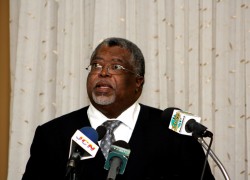
The courts of The Bahamas may soon have to address the issue of same-sex marriages, according to Chief Justice Sir Michael Barnett.
Recently, the British and French Parliaments have passed laws to allow same-sex marriages and equal rights to same sex couples adopting children.
“I have no doubt that it is only a matter of time when the courts of The Bahamas will address the issue of same sex marriage,” the chief justice said while speaking to the National Judicial Council of the National Bar Association recently.
“I also have no doubt that in deciding the issue we will have respect for the decisions that emanate not only from Commonwealth countries like Canada and Australia, but also to the decision of the courts of the United States of America.”
During his address, Sir Michael said that he is praying that the government finds a way to eliminate the English-based Privy Council as the final court of appeal for The Bahamas as many of the judgements made from supreme courts in recent times have mimicked the rulings of courts in the United States and elsewhere.
In recent times, the Privy Council has made some decisions that sparked outrage with many Bahamians.
In 2011, the court overturned the death sentence handed down to convicted murderer Maxo Tido.
A jury convicted Tido of the 2002 brutal murder of 16-year-old Donnell Conover.
Conover’s skull was crushed and her body was burnt.
Tido was convicted and sentenced to death only days after the Privy Council ruled that the mandatory death sentence in The Bahamas is unconstitutional.
The Privy Council held that while it was a dreadful crime, Tido’s behaviour could not be placed alongside the most horrific murders.
“Strictly speaking an appeal to the Privy Council is an appeal to the sovereign, who acts on the advice of the Privy Council. This is relic of our colonial past and I suspect and perhaps pray that Parliament will soon find the wisdom and courage to change the final court of appeal to a different court, whether it be the Caribbean Court of Justice or some other court,” Sir Michael said.
“History will show that early on in our development the courts of The Bahamas only look to decisions of the English courts for discerning the common law. This is perhaps not surprising as the judges of our courts were primarily Englishmen and the final law as to when a breach of a payment clause in a construction contract may amount to a repudiation of a contract. Decisions from CARICOM countries are also referred to on matters involving criminal law.”
He continued, “More frequently however, the judges in The Bahamas have been more receptive to looking at decisions of the courts of the United States for assistance in how to approach issues that come before them for consideration.”
The chief justice said this is particularly so in constitutional cases involving human rights.
“You will recall that the UK has no written constitution and decisions of the UK courts are not always useful in determining issues that come before us for consideration. Indeed, more recent decisions of the United Kingdom courts on human right issues have been greatly influenced by its memberships in the European Union and the European Court of Human Rights,” Sir Michael said.
He added that Bahamian contractors have frequently used the standards contracts of the American Institute of Architects and Bahamian judges look to decisions of the American courts in deciding issues that arise under those contracts.
Sir Michael said that there are other issues that lean more towards the judgement of American courts like the tort of defamation, prenuptial agreements and child abduction cases.
“In Child abduction cases in which The Bahamas courts seek to give effect to the Hague Convention on Child Abduction to ensure consistency in the law, we look to decisions of the US and the court of other countries for assistance in how to approach problems common to all of communities,” he said.
“More and more the citizens of both our countries will find it necessary to resort to the courts of our countries to resolve the disputes that will inevitably rise. Our is an ever shrinking global village. The problems that affect the lives of our citizens and the residents of our respective countries have more in common than there are differences.”


